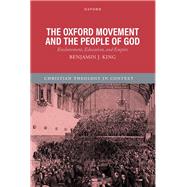The Oxford Movement and the People of God Enslavement, Education, and Empire
, by King, Benjamin J.- ISBN: 9780198739562 | 0198739567
- Cover: Hardcover
- Copyright: 2/21/2025
Seeing the Church in danger from the government in 1833, the clergyman John Henry Newman wanted to 'look to the people' for help. The people of God were vital to the Tractarian (or Oxford) Movement which Newman, John Keble, and Edward Pusey led, and which hundreds of thousands of Anglican laypeople followed during the nineteenth century. The faithful were central to the movement's theological vision. Spiritually disciplined, the faithful would ensure that the Church's work in the world was ongoing. Properly educated, in schools for the middle classes and for the poor, at home and across the British Empire, the faithful would preserve the Church's teaching.
Yet to opponents in the nineteenth century, and most scholars since, the movement seemed to magnify the role of the clergy of the Church of England at the expense of the people. This is to neglect not only Tractarian theology, but also lay Tractarians themselves, whether the few who were important figures in the British nation and Empire, or the many who took part in shaping society.
The Oxford Movement and the People of God covers topics which are not usually encountered in studies of the Tractarians-enslavement, Empire, and English engagement in the American Civil War-as well as showing how their theology of the laity sheds new light on old topics-the Church of England's privileged place in the State, the Ritualist movement, and opposition to democracy. In none of these topics was the movement on what is called, with hindsight, 'the right side of history'. But the theological reasons, such as they were, why Tractarians took the positions they did are explored in chapters concerning providence, ecclesiology, consensus fidelium, episcopacy, and lay spirituality.
Yet to opponents in the nineteenth century, and most scholars since, the movement seemed to magnify the role of the clergy of the Church of England at the expense of the people. This is to neglect not only Tractarian theology, but also lay Tractarians themselves, whether the few who were important figures in the British nation and Empire, or the many who took part in shaping society.
The Oxford Movement and the People of God covers topics which are not usually encountered in studies of the Tractarians-enslavement, Empire, and English engagement in the American Civil War-as well as showing how their theology of the laity sheds new light on old topics-the Church of England's privileged place in the State, the Ritualist movement, and opposition to democracy. In none of these topics was the movement on what is called, with hindsight, 'the right side of history'. But the theological reasons, such as they were, why Tractarians took the positions they did are explored in chapters concerning providence, ecclesiology, consensus fidelium, episcopacy, and lay spirituality.






